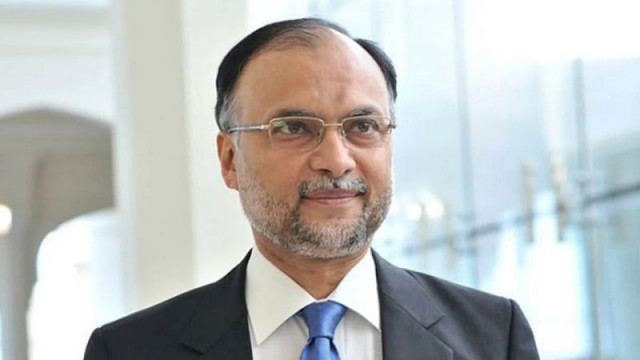Pakistan's goods trade sharply lower than global average
Meeting discusses rail, road infrastructure improvement to address port congestion

Minister for Planning, Development and Special Initiatives Ahsan Iqbal on Friday reaffirmed the government's strong commitment to strengthening seaports' efficiency, boosting trade and ensuring sustainable economic development.
He expressed the resolve while chairing a consultative meeting on enhancing the efficiency of Karachi ports by improving hinterland connectivity.
Member Infrastructure Waqas Anwar presented a detailed briefing on improving port efficiency with progress update from the Ministry of Maritime Affairs regarding a committee constituted by the Prime Minister's Office to address cross-cutting issues at Karachi Port.
He highlighted that Pakistan's merchandise trade as a percentage of gross domestic product (GDP) stood at 26%, significantly lower than the global average of 44%.
"From 2015 to 2020, Pakistan's ports handled over 3 million TEUs (twenty-foot equivalent units) of container traffic annually, with approximately two-thirds managed at Karachi's three terminals and the remainder at Port Qasim."
He pointed out that rail access to Karachi Port was underutilised, with nearly all cargo transported via road, leading to congestion and environmental challenges. He called existing rail facilities insufficient for efficient goods transfer due to their limited capacity for loading and unloading operations.
Karachi Port faces significant road congestion due to a ban on trucks' movement from 6am to 11pm, affecting traffic flow into and out of port areas. Port Qasim, on the other hand, benefits from better road connectivity (N-5 and M-9 via Eastern Bypass), but it may face road congestion by 2030 if rail connectivity is not improved.
To address these challenges, the member infrastructure proposed short- and long-term measures.
Short-term measures include 24/7 port operations while scheduling freight truck movements to reduce congestion. Freight trucks will use port gates only during pre-arranged schedules.
For long-term solutions, it was recommended to develop an elevated expressway as a priority project to ease road congestion.
Simultaneous investments in rail infrastructure were also proposed to enhance upcountry freight transport efficiency and reduce overall transportation costs. Both projects should progress concurrently to maximise long-term benefits.
After detailed discussions, Ahsan Iqbal emphasised the importance of resolving challenges for national economic growth, directing the formation of a committee comprising representatives from the Ministry of Planning, Port Qasim Authority, Ministry of Maritime Affairs, National Highway Authority and Ministry of Railways.
In a separate meeting held to assess progress on projects being executed under the Public Sector Development Programme (PSDP), senior officials of the Ministry of Planning provided a briefing on the allocation, release and expenditure of funds for different projects.
Speaking at the meeting, the planning minister directed the ministry to develop a comprehensive strategy to ensure timely completion of all ongoing PSDP projects.
Reviewing the road infrastructure projects of Balochistan amounting to Rs400 billion, he directed that the projects must be completed within three years.



















COMMENTS
Comments are moderated and generally will be posted if they are on-topic and not abusive.
For more information, please see our Comments FAQ